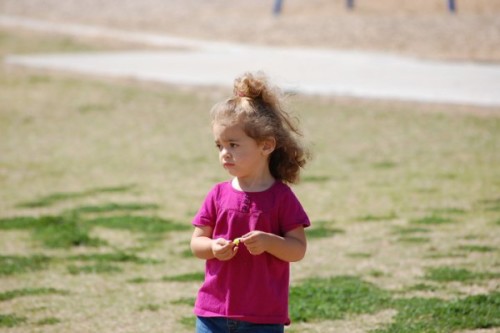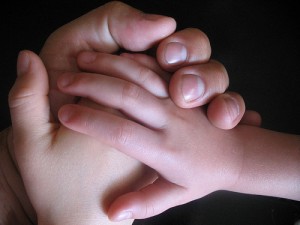There’s an article getting passed around on social media right now titled, “5 Phrases That Will Make Your Kids Stop Crying and Begging.” The author sets the stage of a child who’s upset because she wasn’t allowed to get the candy she wanted at the grocery store. Using phrases such as “Asked and answered,” “This conversation is over,” and “The decision has been made. If you ask again there will be a consequence” will halt such tantrums on the spot, she tells us, and remind the child who’s boss. By the way – and I hope it’s not too much of a spoiler alert – when she says, “consequence”, what she really means is “punishment”.
Now I tend to be a parent who says, “yes” as much as possible. An occasional cookie or two before dinner, or an inexpensive impulse buy at the checkout lane don’t really rank on my list of things on which to draw a hard line. But even if they did? Even during those moments when I do absolutely have to say “no” to something? (And yes, to be sure, there are moments when I need to say no) That is a time to help them learn to work through their disappointment in a healthy way. It’s a time to hear them, and to empathize with them. It is NOT a time to ignore their feelings and shut them down. It is not a time for punishing them for being human. Being sad or disappointed sometimes is normal and okay!
Approaches like the one outlined in this article not only teach a child to squash their emotions. They are also extremely adversarial, and set up an “us vs them” mentality between parent and child. While some parents would advise that it’s simply a matter of learning to pick your battles, I never want to view any interaction with my child as a battle. We’re on the same team!
Here then are five alternative things I might say when my child is crying or disappointed.
-
I’m sorry.
When a dear friend is venting to you because he got passed over for a promotion, do you shut him down with a “This conversation is over”? Of course not. You tell him you’re sorry. To a toddler, that cookie is just as important as the promotion, and his feelings of sadness are real. I think adults probably tend to forget that, because social media has made it so easy for parents to share and pass off children’s big feelings over seemingly small things as funny or cute. But their feelings are genuine, and because they are young, they know no other way to express them other than through crying or yelling. As a parent you can either shut them down and essentially tell them to stop feeling what they’re feeling, or you can help them work through it, and by extension eventually learn more mature or sophisticated ways of expressing their emotions. I always strive to go with the latter, and it all starts with empathy.
-
I hear you.
Or I know, or it really stinks. I’ve been in and out of doctors’ offices a lot this year, especially the last few months. And while some of my symptoms are things that the doctor can see, or quantify on paper, some are completely subjective (like pain and fatigue.) This past week, one of my doctors said the best thing I’d heard in months. She said – and meant – “I believe you.” Seriously, it was huge for me. Anyone who’s ever suffered from a mystery ailment knows how incredibly frustrating it is to think that everyone around you is starting to believe that you’re just crazy. I think that one of the biggest things we need and desire as humans sharing this world is just to be heard. We want to know that someone is listening, that they are hearing what we are saying, and that they understand. Children are no different. Telling them that you’re sorry is a great place to start, but when you tell them that you hear them… that you understand… that YES, I know you wanted that cookie and it really sucks sometimes when we don’t get what we want… you’re taking it one step further, you’re validating their feelings, and you’re letting them know that you get it. That is a hugely powerful and healing thing, to kids and adults alike.
-
It’s okay to be sad.
Did you ever notice how often adults apologize for crying? They’ll be engaged in a conversation, and be overcome with emotion. They’ll well up, or a tear will escape, and they’ll shake their head and mutter, “I’m sorry,” while quickly brushing the tears away. I can’t help but wonder if it’s because it’s such a common practice to tell kids to stop crying. Are we creating a whole society of emotionally stunted adults? It’s okay to be sad. It’s okay to cry. Giving your child a safe space to feel what they feel, and letting them know – whether through words or actions – that what they’re feeling is okay goes a long way towards helping them work through their emotions.
-
How can I help?
A couple of weeks ago, Tegan (7 at the time of this writing) was terribly disappointed about a cancelled play date and sleepover that she’d been so looking forward to for days. It had been a long time since I’d seen her that disappointed about something. She didn’t want to play, didn’t want to use the computer (ordinarily one of her favorite things) and didn’t want to talk to any friends. I hugged her, told her how sorry I was, and finally asked, “Do you want to do something with me to take your mind off it, or do you just need to be sad?” She answered, “I just need to be sad.” So she was. I sat with her on the couch, and I gave her space to be sad. I think our first response too often tends to err on the side of trying to cheer someone up, probably because we’re uncomfortable with expressions of big feelings (see number 3). But sometimes what a person needs is to just be sad. And sometimes they do want to be cheered up! The only way to know for sure is to ask, and in the case of a younger child, read and respect what they’re telling you non-verbally.
-
Next time….
In the case of the cancelled sleepover, there really wasn’t anything I could do to make it better, other than tell her I was sure we’d be able to reschedule for another time. (We were, and we did, and she had a great time). Sometimes though, depending on the child and the circumstance, it can be helpful to be specific about future plans:
“Next time we come to the store, we’ll get a balloon.”
“Payday is Friday, so we can get ice cream then.”
“We don’t have time to stop at the playground today, but we can go this weekend.” Etc.
And then be sure to follow through! The foundation of a good relationship with your children – of a good relationship with anyone – is trust, and letting them know 1) that you’re on their side, and 2) that your word is good goes a long way towards establishing that trust.
—————————————————————————————————————————————-
Our interactions with our children should never be about manipulation and control. They should be about connection, and about helping these little people entrusted in our care to navigate the world with kindness, compassion and respect. Dealing with, and working through, emotions is a big part of being human, so the last thing we want to do is deny our children that experience…. especially when they can do it with their most trusted adult at their side.













